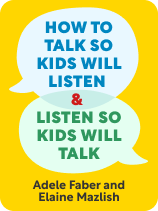

This article is an excerpt from the Shortform book guide to "How to Talk So Kids Will Listen & Listen So Kids Will Talk" by Adele Faber and Elaine Mazlish. Shortform has the world's best summaries and analyses of books you should be reading.
Like this article? Sign up for a free trial here.
How can you help your child form a healthy self-concept in early childhood? Why is it important to challenge stereotypes?
According to Adele Faber and Elaine Mazlish, the way you think about your children becomes the way they think about themselves. To foster a healthy self-concept in early childhood, they claim that you should challenge preconceived ideas, stereotypes, and labels about yourself and your children.
Read on to learn how to help children form a positive self-concept in early childhood, according to Faber and Mazlish.
Self-Concept in Early Childhood: Challenging Stereotypes
Dubbed “the parenting bible” by The Boston Globe, How to Talk So Kids Will Listen & Listen So Kids Will Talk by Adele Faber and Elaine Mazlish helps parents learn to better communicate and empathize with their children. According to the authors, an important step in building communication and self-concept in early childhood is re-thinking any stereotypes you have, even unconsciously, about your children, and helping them resist the labels others may foist on them. The authors claim that the way you think about your children becomes the way they think about themselves. One of the authors describes how a nurse labeled her newborn son “stubborn” because he wouldn’t breathe right away. This label stuck, and it was hard for her to think of her child differently. The idea that he was stubborn became a self-fulfilling prophecy.
| How Negative—and Positive—Stereotypes Hurt Kids When kids are stereotyped either negatively or positively in early childhood, it impacts their self-concept because they may end up having to deny some of their authentic feelings to fit into that narrow role. Negative stereotypes make it hard for kids to behave differently. Even positive stereotypes can have negative effects, because if a child is called, for example, the “smartest kid in the class,” they may feel less likely to take risks or raise their hand in class to answer a challenging question; if they get it wrong, they might ruin their reputation for intelligence. These stereotypes may operate at school, socially, and even at home. For example, in some families different children are pigeonholed into a few narrow roles. There is the scapegoat, or black sheep, who gets blamed for all of the problems in the family. There is the golden child, who is supposed to be perfect and always make their parents happy. Psychologists say that adults suffering from golden child syndrome can experience anxiety, perfectionism, and depression, have trouble setting boundaries, bend over backwards to please others, and become too reliant on external validation. Fortunately, if people become more aware of the roles they were made to play as children, they’ll be better able to deal with these issues. Following Faber and Mazlish’s advice will make it less likely that children will be forced into narrow roles in the first place. |
To foster a healthy self-concept in early childhood, first, here’s what not to do: Don’t label children or let others label them. If someone calls your child shy, you may keep thinking of them that way even if you try not to. If you, or others, call your child bossy, irritating, or selfish, they’ll act that way, the authors say.
Now, here’s what Faber and Mazlish say you should do instead. These are ways to help your child realize they’re more than the labels imposed on them, which will help to strengthen their self-esteem and self-concept in early childhood.
Don’t Stereotype Yourself
If you make a mistake, don’t call yourself “stupid” or “clumsy”; talk about what you can do better next time. Just as you would for a child, when you’re talking about yourself, address the behavior rather than the person. Model helpful responses to difficult situations. If you have to clean up a messy kitchen, admit to your child that you feel a little overwhelmed because it’s a big job, but then talk about how you’ll do it step by step.
Set Expectations
If your child acts up, tell them how you feel and how you’d like them to behave. For example, if your child forgets their keys at school, tell them you expect them to be able to remember important items like keys. If you express confidence that they’re capable, they’re more likely to act capably, the authors explain.
Help Children See Themselves Differently
If your child has been pigeonholed as forgetful, try giving them responsibility to show that you trust them, say Faber and Mazlish. If others (or you!) have called your child clumsy or uncoordinated, give them a chance to show off their somersaults or help you fix a broken toy.
Praise Children to Others in Their Presence
While on the phone to their grandma or talking to a neighbor, counter possible stereotypes of your child by talking about how they behaved differently, and let the child hear you. For example, if your youngest has been called babyish, tell others how they acted maturely.
| Free Children From Rigid Sibling Roles While consciously trying to counter stereotypes, parents may unconsciously let birth order influence how they treat their children. For example, they might think of their oldest child as the one who should be mature and responsible, the middle child as difficult, and the youngest as the one they can baby and spoil. In Siblings Without Rivalry, Faber and Mazlish discuss how parents can help liberate their children from these restrictive sibling roles. For one, they recommend that parents examine how their own birth order might be shaping how they treat their kids. A dad who was an older brother as a child and always considered his younger sister an annoyance might sympathize more with his older child when his own children are fighting, while another parent who was a younger sibling might sympathize more with their younger ones. Faber and Mazlish also caution parents that they might not know everything going on between their children; maybe parents have stereotyped one as a bully because she seems to start fights, but the other sibling is needling her in ways the parents don’t notice. It’s also important for a healthy self-concept, the authors add, to treat children during early childhood not as they are, or as they seem to be, but as you would like them to become. Even a child who constantly teases his sister has a capacity for kindness that can be encouraged; even a child who seems to always be the victim can be taught to stand up for herself. |
Remind Children of Their Past Success
Counter the adjectives others may have forced on your child by reminding them of the ways they’ve acted differently in the past; for example, if your child tells you their teacher called them messy, talk about a time they were organized.
If you remind your child of previous times when they demonstrated admirable qualities, you’ll reinforce those qualities, Faber and Mazlish say. Focusing on the positive during early childhood will build your child’s self-esteem and self-concept, show your child that you’re supportive, and build a relationship of mutual trust and respect. This foundation will make it easier to respond when your child doesn’t behave as you would wish. The next section discusses how to respond using alternatives to traditional forms of punishment.
(Shortform note: Dr. Laura Markham suggests another way to point out children’s successes. She advises parents to focus not on telling a child they made you happy, but on sharing with them the effects of their positive behavior. For example, you might tell a child, “Rebecca was really happy that you gave her a turn on the slide.” This helps children understand why they should behave kindly—it’s not merely to please you, but to make others’ lives better.)

———End of Preview———
Like what you just read? Read the rest of the world's best book summary and analysis of Adele Faber and Elaine Mazlish's "How to Talk So Kids Will Listen & Listen So Kids Will Talk" at Shortform.
Here's what you'll find in our full How to Talk So Kids Will Listen & Listen So Kids Will Talk summary:
- How to build mutually respectful relationships with your children
- How to make your children feel heard and understood
- Methods for effectively praising and scolding your children






